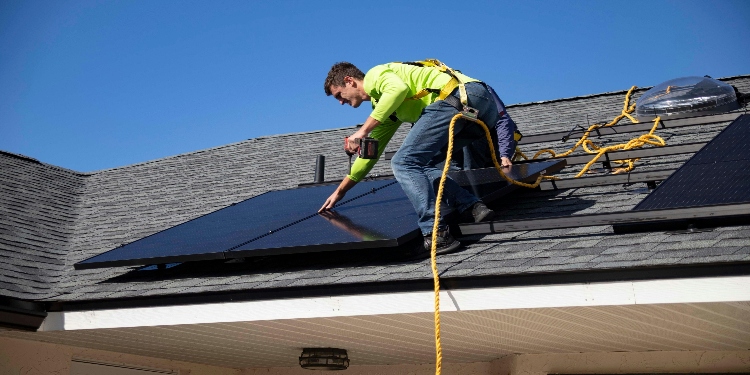Have you ever wondered whether solar panels are worth the investment? Many homeowners are switching to solar, but making this decision can feel overwhelming. In this article, we’ll explore the top financial factors to consider before installing solar panels.
Whether you’re looking to save on your energy bills or invest in a more sustainable future, understanding these financial aspects will help you make a smart, informed choice.
Upfront Cost
The cost of installing solar panels can be significant. It includes the price of the panels, inverter, wiring, and installation services. These expenses can vary depending on the size and type of system you choose.
You might need to upgrade your electrical system to accommodate the solar panels. This can add additional costs to the installation. Be sure to gather multiple quotes from contractors to get the best price for the job.
Incentives and Tax Credits
Several financial incentives may be available to reduce the cost of solar panel installation. The federal government offers a solar tax credit, which can cover a percentage of the installation cost. The availability of state and utility rebates and incentives for solar energy use varies widely by region.
These programs can lower the upfront cost significantly. However, incentives and tax credits vary by location. Be sure to research what is available in your area to maximize your savings.
Financing Options
If you cannot afford the full upfront cost of solar panels, various financing options are available. Consider a solar loan, lease, or power purchase agreement. Each option has its benefits and costs, and it’s important to understand the terms before making a decision.
A solar loan allows you to own the system, paying it off over time. Leasing or a power purchase agreement means you pay a monthly fee without owning the system.
Before making a decision, consider the best solar power energy companies to compare financing offers and find the best option for your needs. Carefully evaluate your financial situation and choose the option that fits your needs.
Energy Savings
One of the main benefits of solar panels is the reduction in energy costs. After installation, your monthly electric bills should decrease as you generate your own power. The amount you save depends on the size of your system and your energy usage.
It’s important to calculate your potential savings before installing solar panels. The savings can help you recover the initial cost over time. Keep in mind that energy savings will continue to grow as electricity prices rise.
Maintenance and Repairs
Solar panels are generally low-maintenance systems. However, they do require occasional cleaning and occasional repairs. Over time, parts like the inverter may need to be replaced, which can add to your costs.
Maintenance costs are generally lower than other home improvements. Solar panels are designed to last 25 years or more, so you may not need many repairs. It’s important to set aside some money for unexpected repairs to avoid surprises.
System Size and Efficiency
The size of your solar panel system depends on your home’s energy needs. A system that generates more electricity may be more expensive, but it can help you save more over time. Balance your energy use with the system size to avoid overpaying.
The efficiency of the system also plays a significant role in how much electricity it can generate. More efficient systems may cost more, but they can produce more energy in less space. Make sure the system size matches your energy goals to maximize savings.
Property Value
Installing solar panels can increase the value of your home. Many home buyers value the long-term energy savings that solar panels offer. Homes with solar panels are often seen as more energy-efficient and environmentally friendly.
In some markets, homes with solar panels can sell for a premium. However, the effect on property value varies by location. It’s helpful to know how solar panels affect home values in your area before installing them.
Electricity Rates and Utility Policies
The cost of electricity in your area can affect the financial benefits of solar panels. If electricity rates are high, you may save more money by using solar power. You should also check if your utility offers net metering, which allows you to sell excess electricity back to the grid.
Utility policies vary from place to place. Some utilities offer credit for excess power, while others may have different rules. Understanding these policies can help you estimate how much you can save with solar energy.
Expected Lifetime and Warranty
Solar panels typically have a long lifespan, lasting 25 years or more. However, their efficiency may decline over time, particularly after the warranty period ends. The inverter, which converts solar energy to usable electricity, may need replacement after 10 to 15 years.
Most solar panels come with warranties that last 20 to 25 years. These warranties often cover repairs or replacements if the panels fail to perform as expected. Consider both the warranty and the system’s expected lifespan when making your decision.
Long-Term Savings and Return on Investment (ROI)
When considering solar panels, it’s important to evaluate the long-term savings and overall return on investment (ROI). Over time, the cost of the system can be offset by the savings on your monthly electricity bills.
Your ROI will depend on factors such as your energy consumption, system size, and local electricity rates. The timeframe to recoup your investment varies significantly based on many factors, including region and energy usage. After that, the energy savings are essentially profit. It’s crucial to calculate this long-term financial benefit when deciding if solar is right for you.
Save the Planet With Solar Energy
Investing in solar panels can offer long-term financial and environmental benefits, but it requires careful planning. Understanding costs, savings, and incentives is key to making a sound decision. The right approach can significantly reduce your electricity bills and increase your home’s value.
Solar energy benefits the planet and offers a smart financial investment. By taking the time to research, you’ll make a choice that pays off in the years ahead.
Was this article helpful to you? If so, make sure to check out our blog for more useful information and resources.


![7 Best POS Software in the UK [2026 Edition]](https://todaynews.co.uk/wp-content/uploads/2026/02/7-Best-POS-Software-in-the-UK-2026-Edition-360x180.png)








































































